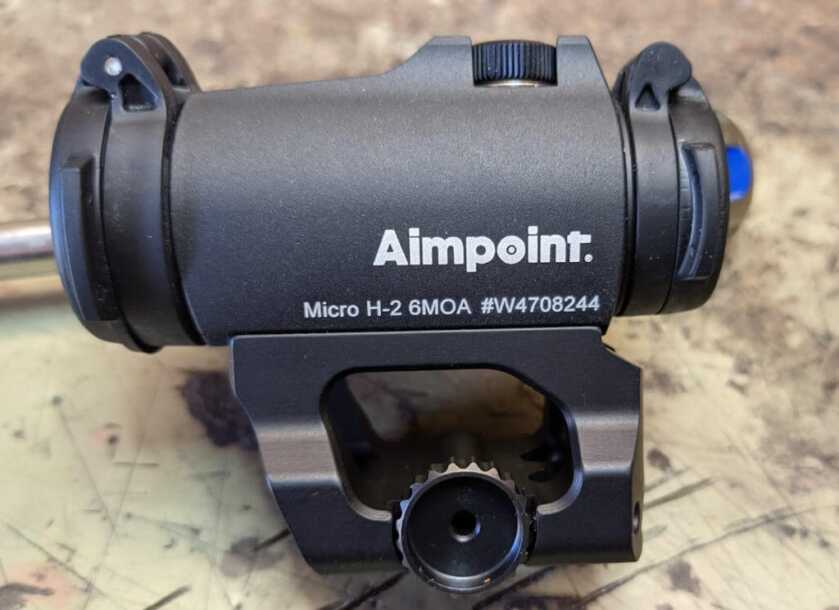
Small dots suck! And the majority of the firearms industry has been lying to you. The last 8 years or so has seen an explosion of quality rugged red dot sights (RDS) from many manufacturers in the firearms industry. Together with all these sights came small dots. Customers were sold a bucket of lies, that they needed small dots for “precision”. Today I am going to explain to you why small dots suck and you don’t need them for “precision”. I am also going to explain why the Aimpoint H2 with 6MOA dot is the new king of rifle dot sights.
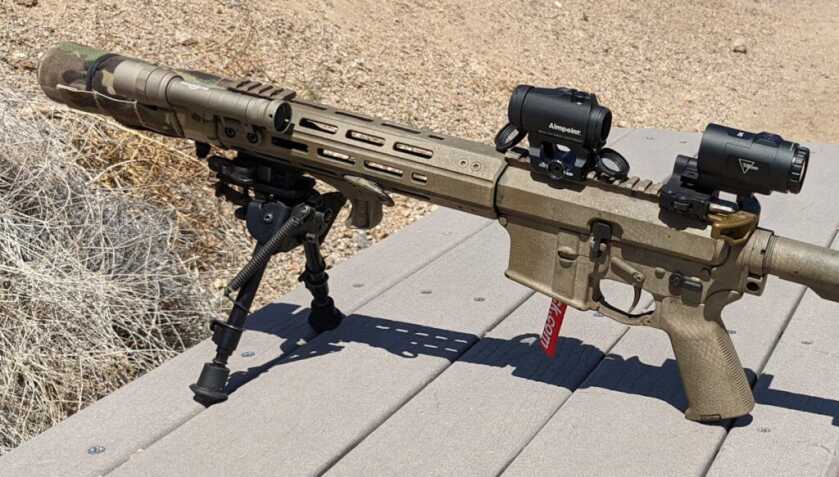
When you buy an RDS with a 1MOA, 2MOA, or 10MOA dot what does that mean? Dot sizes are measured in MOA or Minute of Angle. While many people think 1MOA=1 inch at 100 yards, the real answer is 1 MOA=1.047 inch at 100 yards. For the sake of easy math and simplicity for this article, I will be going with the common 1MOA=1 inch at 100 yards. So if you have a 2MOA dot in your RDS that means the dot covers 2 inches at 100 yards. A 6 MOA dot covers 6 inches at 100 yards and so on. For every 100 yards, you add the original dot size to know how big it is at a given distance. That means a 2MOA dot covers 4 inches at 200 yards, 6 inches at 300 yards, and 10 inches at 500 yards.
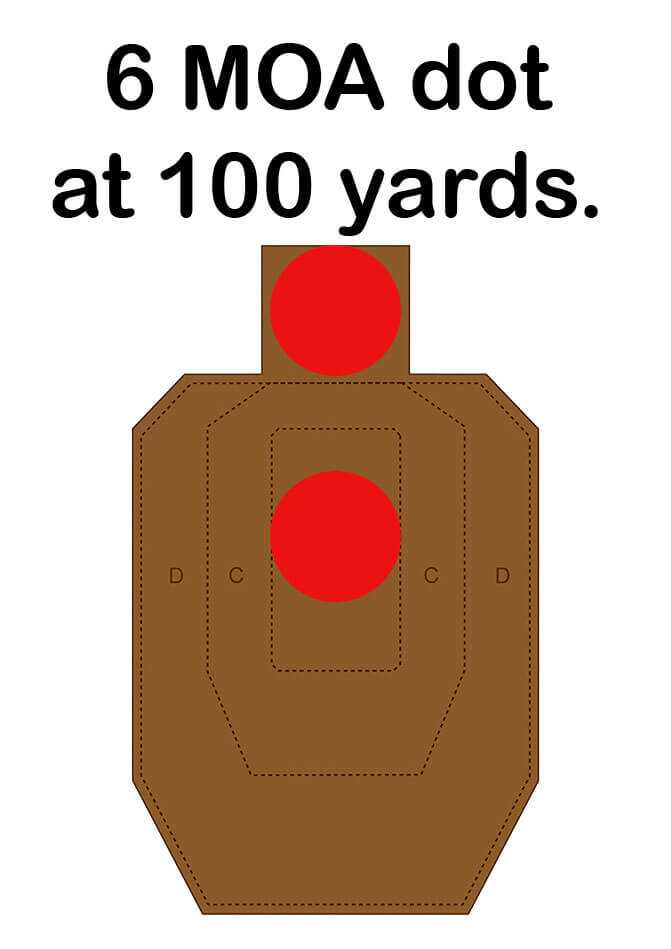
Aimpoint is the inventor of red dot sights with the first model released in 1974. You can see elements of the original design in many modern Aimpoint sights. I have an Aimpoint G2 from 1978. It even came with a 3x magnifier that screws into the rear of the optic.
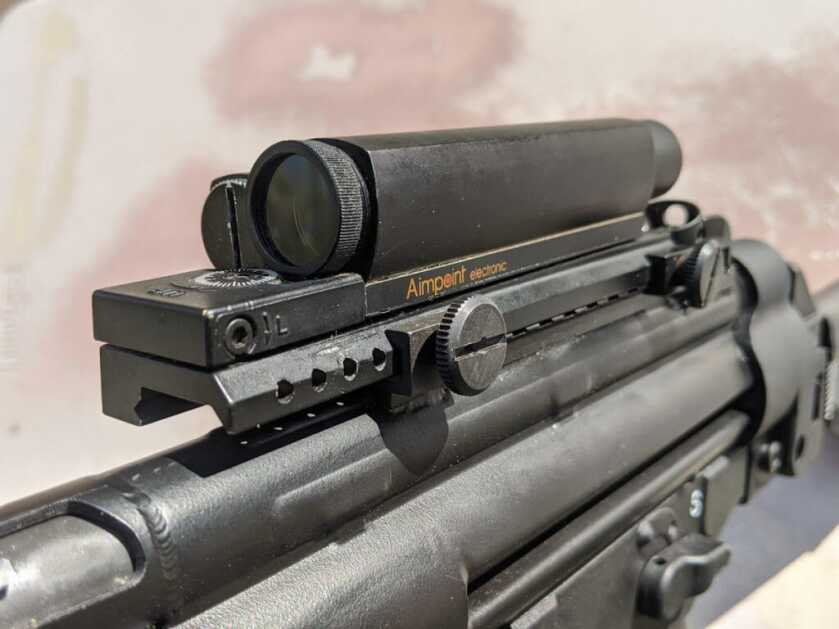
Red dot sights really took off in 1990 in the pistol competition world after Jerry Barnhart won the USPSA Nationals and Doug Koenig won the IPSC World Shoot using red dots. Soon competition shooters wanted bigger dots that were easier to see and faster to acquire in matches that could be won or lost in tenths of a second. The market responded by making sights with bigger dots and it was not uncommon to see 8, 10, or 16MOA sights used in competition. Some competitors even used 20MOA dots for competitions like the Steel Challenge. Red dot sights started gaining traction in the tactical market in the late 1990s and today they are more popular than ever.
The 2000s is when things started to change and companies were trending towards smaller dots — 1, 2, and 4MOA. These days it’s hard to find a rifle RDS with a dot larger than 2MOA. In 2017 Aimpoint launched the S1 for shotguns based on the success of their micro T1 and H1 RDS. The S1 was designed to attach to the vent rib of a shotgun and featured a 6MOA dot. Shortly after the S1 hit the market I heard rumors of a T or H series with a 6MOA dot. I looked for years and could not find one until recently. In early 2021 I found my unicorn, the H2 6MOA Aimpoint. It was actually launched in 2018 but I was not able to get my hands on one until now. For the last couple of months, I have been beating on it and testing it for this story.
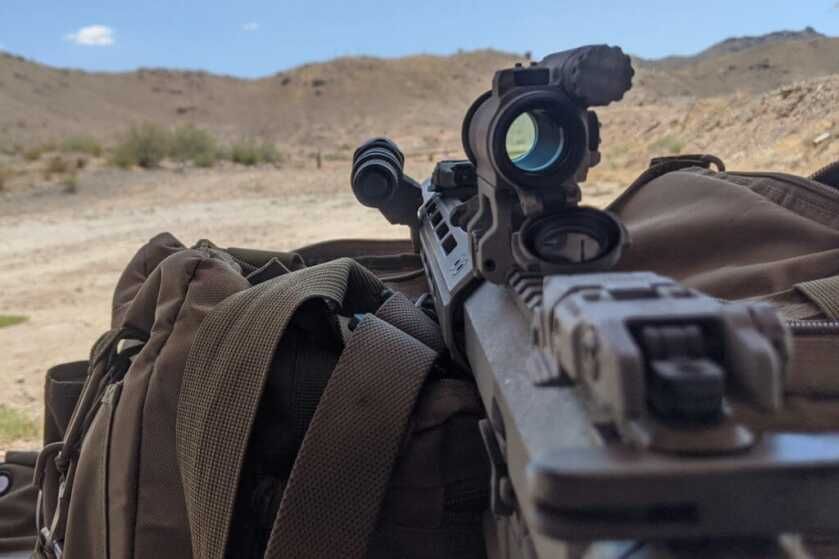
As you would expect from Aimpoint it is super rugged and can take a ton of abuse and just keeps working. Like its counterparts in the T and H series, its battery is rated for 50,000 hours (5.7 years) so the larger dot does not require any extra power.
An H or T series Aimpoint is most likely going to be used on a rifle; where we were told we need precision. Precision is good in a rifle, but you’re not going to get true precision from an RDS at rifle ranges. When I say precision with a rifle I am talking about 5 shot groups that are Sub-MOA, or less than 1 inch at 100 yards. I know some of the most talented shooters in the world. I don’t think any of them could consistently produce Sub-MOA groups with an AR-15 and an RDS. For that setup, I would consider a 2 inch or smaller group to be exceptional and a 4-inch group to be very good at 100 yards.
What I want out of a tactical autoloading rifle is the ability to hit a full-size IPSC (30×18 inches and torso shaped) target at 300+ yards and make fast shots center mass inside 50 yards. An RDS is a great choice for these requirements. So how much “precision” do you need to do that? How small a dot do you need? The answer is: not as small as you think. This is all easily doable with a 6MOA dot.
I did testing on a 10.5 inch AR using the H2 6MOA with a 100 yard zero. The dot only covers 3 inches at 50 yards; that’s good enough for a headshot if you can keep the rifle stable. From 0-50 yards the large dot is significantly faster to acquire than the small dot.
Small dot lovers like to say they can just turn it up to make it look bigger and go fast. Turning it up gives you dot flare and often a halo on the edges of the glass. To me, that’s distracting and silly. When turned up, small dots also lose shape and often look like a smear or a shape other than a circle. Even at regular power, small dots tend to lose their circle shape as our eyes get older.
It’s far better to have the large dot, as you don’t need to turn it up for speed or bright sunlight and it stays a perfect circle with crisp edges and no flare. You also have the ability to turn it down. This is where the “precision” argument falls apart. At 100 yards I can shoot tighter groups with the 6MOA than with a 2 or 4MOA dot because I can turn it down. With the H2 6MOA I turn it down so that the dot is translucent and I can see my target through the dot and pick a specific spot to aim at. Using the H2 and a 3x magnifier I was able to consistently shoot 5 shot 3-inch groups at 100 yards. With a 2MOA Aimpoint Comp M5 the dot still covers part of the target and when turning it down to see a specific spot on the target I can no longer see the dot. The small dots block the target while you can see through the large dot.
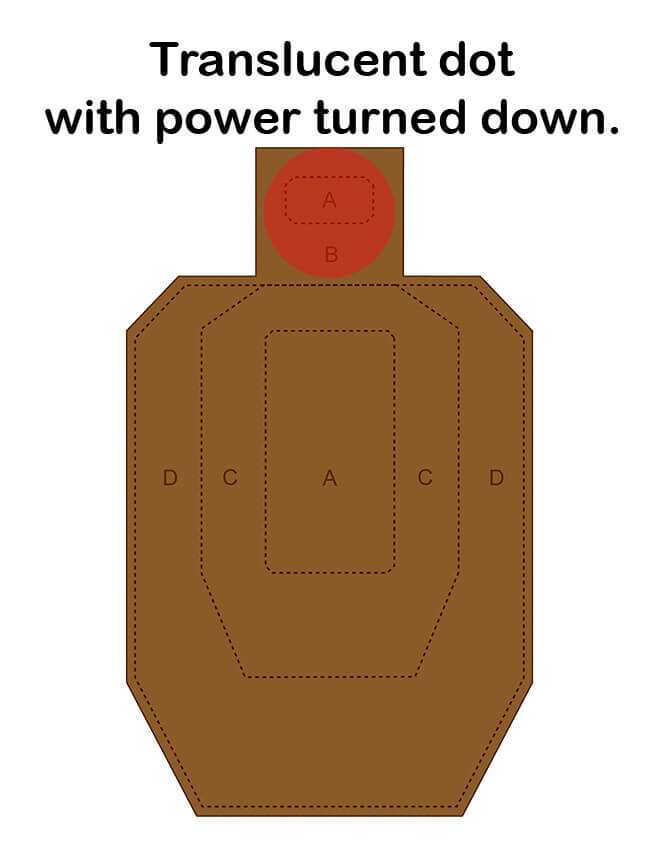
Let’s look at distance shooting with that same 100-yard zero shooting full-size IPSC targets. At 5 yards I need to aim 2.5 inches high, at 50 yards 0.6 inches. So from 0-100 yards just hold where you want to hit unless it’s a head shot inside 25 yards. At 150 yards I have 1.1 inches of drop, same hold. At 200 yards there are 4 inches of drop, so I hold slightly above where I want to hit. Still, no problem with a 6MOA dot not turned down. 250 yards has 9 inches of drop, the dot covers 15 inches so I hold half a dot high. 300 yards has 16 inches of drop, the dot covers 18 inches, so I hold the bottom of the dot on the face. 400 yards, 38 inches of drop, the dot covers 24 inches so I hold the dot just over the top of the head. At 500 yards, 72 inches of drop, the dot covers 30 inches, hold a little over 2 dot diameters over the head.
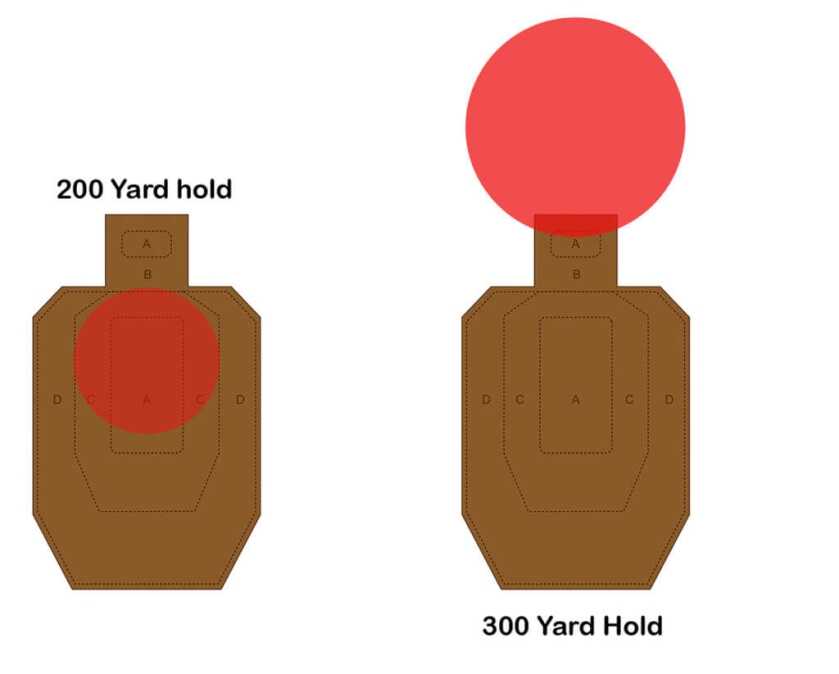
Small dot guys say the big dot covers too much at distance, but as you can see at 300 yards and beyond where the 6MOA dot would cover a lot of the target, you are holding off target so it covers nothing. In fact, with the 6MOA dot it’s easier to estimate where to hold at 400 yards and beyond. At 500 yards with a 2MOA dot you have to hold about 7 dot diameters over the head. That’s a lot harder to do on the clock or under stress than holding 2 dot diameters over the head.
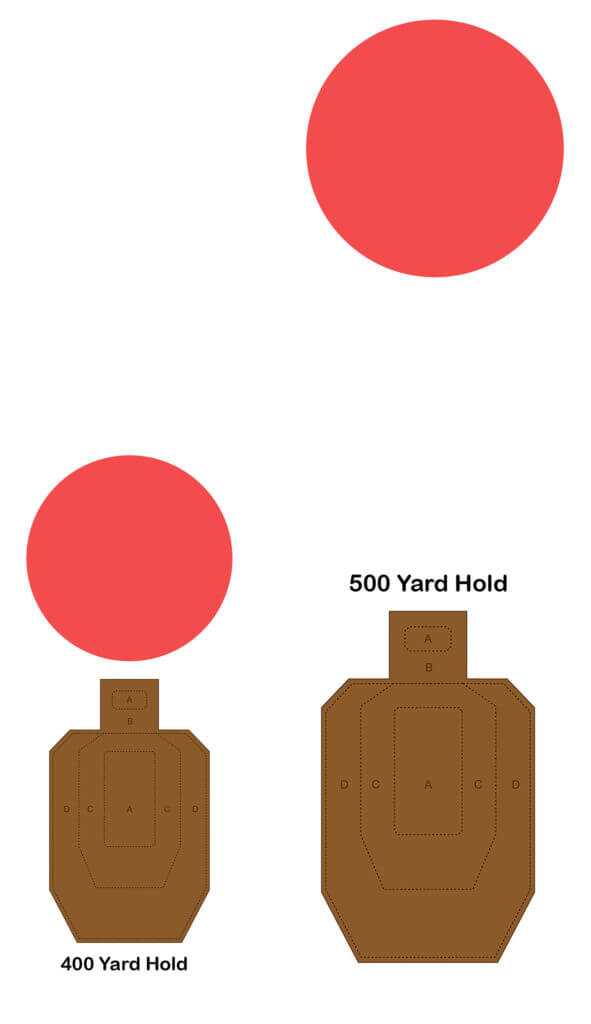
If you want to get more advanced and have access to a chronograph and a ballistic program you can simplify your holdovers with some math. IMI Razorcore 77gr ammo chrono’s at 2490 fps out of this AR and I used a 50 yard zero. After putting the rest of the data into my ballistic app (I use Shooter but they all work) I have a DOPE card and know my drop at any given distance. The app shows that the bullet will drop 21.5 inches at 350 yards, or 5.9 MOA. Remember that the app uses real MOA where 1 MOA = 1.047 inches at 100 yards. My dot is 6MOA so the diameter of the dot is roughly the same as the DOPE for a 350-yard shot. I said I used a 50-yard zero but, I used a top edge zero.
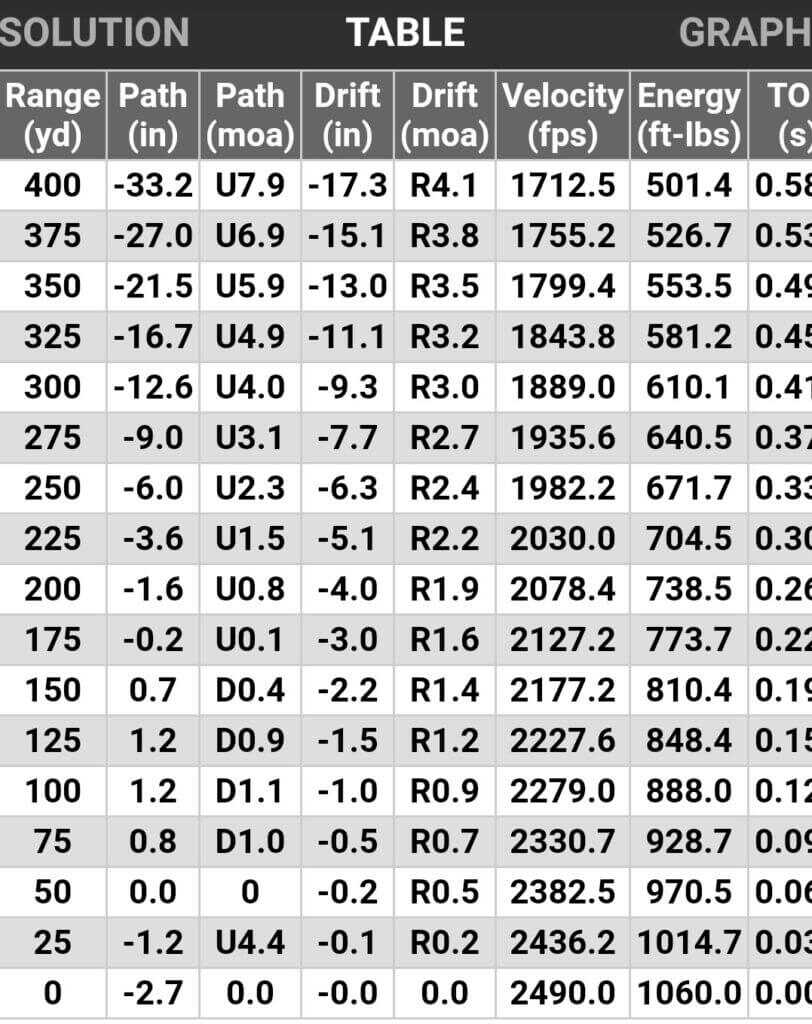
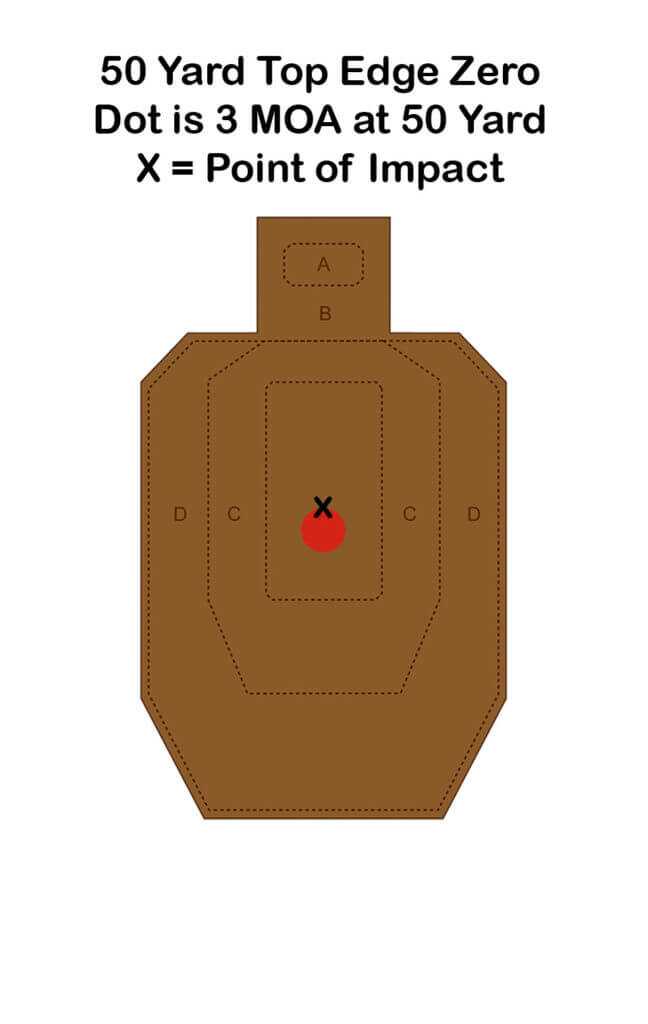
At 50 yards that means my shots hit the target at the top edge of the dot, it’s much easier to do with a magnifier. That means out to 350 yards the bullets will hit within the diameter of the dot. Imagine the dot of your RDS as a cone when viewed from the side. As the range increases, so does the size of the dot. But with a 50 yard top edge zero the bullets always stay inside the cone out to 350 yards. Put what you want to hit inside the dot and pull the trigger, easy like Sunday morning.
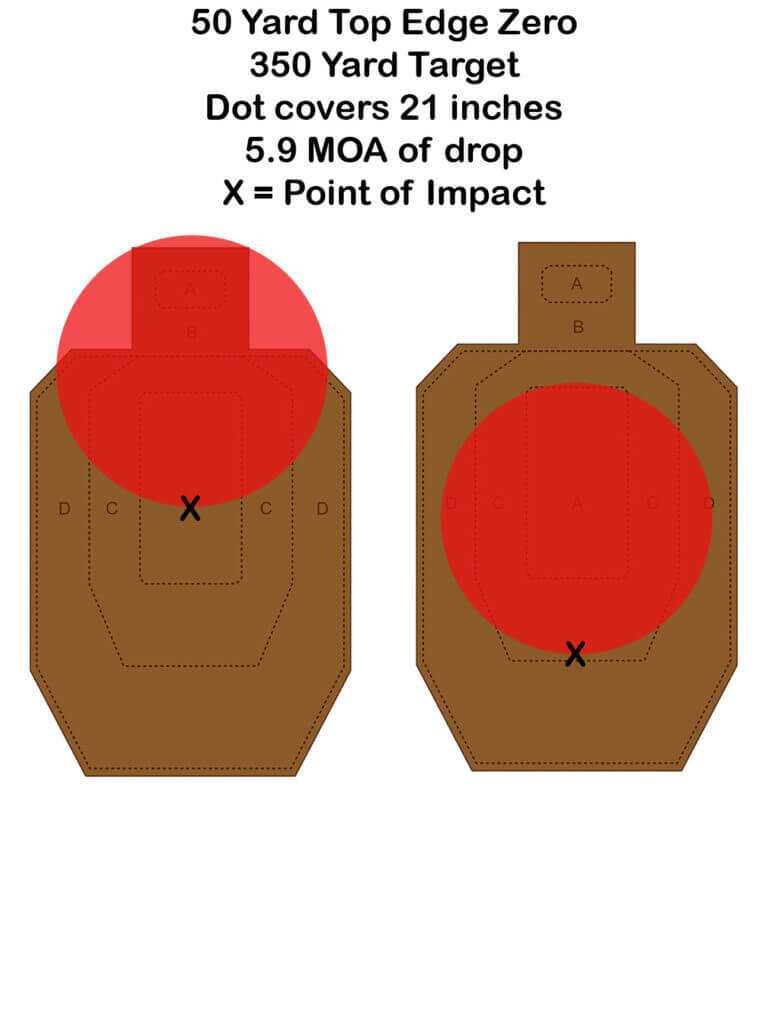
This is what works for my setup. If you have a different dot size, longer or shorter barrel, faster or slower ammo, bullets with a higher or lower BC your results will be different. That is why you need to Chrono your ammo in your gun and put your data into a ballistic app.
I have practiced and shot multigun competitions from 5-500 yards with both 2MOA and 6MOA Aimpoint sights. At all ranges I found the larger dot to be superior in speed and accuracy. The Aimpoint H2 6MOA is a home run. I will be replacing all of my small dot Aimpoints with it. If you have never tried running a larger dot I strongly encourage you to ignore the small dot myths and lies and try it for yourself.
Aimpoint H2 6MOA Specs:
MSRP $745
Dot size 6MOA
Battery Life 50,000 hours
Battery CR2032
Settings 12 – no night vision settings
Weight 3.3 oz (sight only)
Submersible 15 feet / 5 meters
Temperature range -20F to +140F
Links.
Aimpoint H2 6MOA Aimpoint 200489
Scalarworks Leap Mount Leap SW0100
Trijicon 3x Magnifier Trijicon Mag C

How bout a 6 moa red dot, with a 1 or 2 moa hole or clear dot in the center? That way u can utilize the large 6 moa dot how u would normally use it, but still have that small “clear” dot in the center for more precise shots?? I think would be verty interesting & very versatile reticle. Or do u think it’s dumb? Lol
Check out the Holosun 407CO. It has an 8MOA Donut which is more or less just what you describe. I shot a match last month with one on an M1 Garand. The big dot is ideal for close targets that you shoot (some targets you stab. One does not go to an action rifle match with a Garand without bringing a Bayonet). On longer shots you can see the target in the middle of the Donut. Having used both I prefer the H2 6MOA as it can be translucent, the Holosun has a much rougher brightness between settings. Comparatively its either too bright or too dim when shooting long range. That said the 407CO is a way to try a large dot for a rifle at a bargain price.
This 70 year old has been using either a 4 or a 6 dot & six is my preference but some of my favorite suppliers don’t make 6 dots so I make do. Would not go any lower than a 4 though what everyone says is right-them 1 & 2 dots get smaller and smaller the older I get must be them Chinese factories I guess 🙂 next thing you know the Nikes won’t fit. Live in the suburbs now so my target is one of them nice bright yellow fire hydrants a 6 dot at 100 covers the top bonnet nicely and if you shoot a hydrant, the best show is blowing the top off.
Very good article, and pretty much agrees with what works for me with a red dot. Full disclosure, I’ve never used a large red dot sight and don’t do well with small dots (including an early nineties Aimpoint inherited from a cousin). My eyes pick up a circle dot reticle much faster than a single dot and give me a reference for hold over or lead on a moving target as well as bringing my focus to the center of a closer target. It doesn’t seem to matter if it’s a broken circle, circle with cross hairs, etc., that style works for me.
Though a recreational shooter for over six decades I’m not a competitor and have no where near your experience; I simply try to find things that work best for me within my budget, which is more Holosun than Aimpoint. I do wish there was a wider selection of mid price circle dot sights, especially ones made elsewhere than China. Thanks for the informative article!
Hi Matt,
Great article with great information!
Since you’re replacing all your small dot Aimpoints with a large dot RDS, can I buy your small dot Aimpoints, please?
LOL. They are all gone, a 4moa H1 is all I have left.